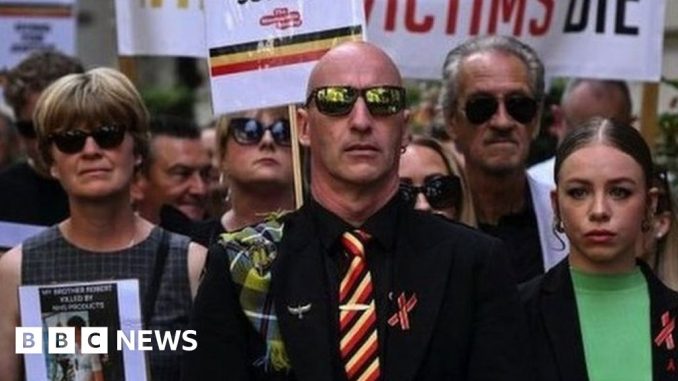
The Tainted Blood campaign group chairman, Andy Evans, who was infected with HIV and hepatitis C as a child through his haemophilia treatment, said publication of the report would be a “defining” moment after decades of campaigning.
“This is where we pin our hopes, really – we don’t have anywhere else to go after this,” he said.
“From the very beginning, victims have been gas-lit by government saying that the treatment was the best available and every decision was made with the best intention and with the best information they had available at the time.
“Through the course of the inquiry, that’s proven to be false. The testimony that we’ve heard, both from victims and from people in office and the NHS, has shown that that wasn’t true.”
During the four-year inquiry, victims and their families have given evidence alongside former and current ministers, including Lord Clarke, who was health minister in the 1980s, and the current chancellor, Jeremy Hunt, who also gave evidence in his former role as health minister.
Speaking to the BBC’s Westminster Hour on Radio 4, Labour’s Dame Diana Johnson, the leading MP campaigning in parliament for the victims of the scandal, said many of the victims and their families were “apprehensive” and “worried” ahead of the report’s publication, as “so many times before they’ve been let down”.
She said those affected by the scandal had had to “battle and battle” against successive governments who had denied any wrongdoing since the 1980s, and that compensation for them would be “an acknowledgment of what the state did to those individuals and their families”.
She said there was hope that their main questions – “Why was this allowed to happen and why was it covered up for so many years?” – would be answered by Sir Brian.
Speaking on the same programme, former Business Secretary Sir Jacob Rees-Mogg said, “If the state has killed people it has got to pay the price”, and that the government “should not shy away from it being expensive”.
He added that the scandal demonstrated a “defence mechanism within the institutions of the state which we need to break down”.
“For some reason there is a desire to cover up the mistakes made by long since passed government to no benefit of anybody who is currently in government…I do not understand why the state is not more open to saying yes mistakes were made.”
On the issue of compensation for victims and their families, the Conversative MP said: “People deserve this compensation. This is one of the most important bills the government will pay.”
Campaigners have also been critical of how long it has taken to get a public inquiry.
In other countries that faced contaminated blood scandals, including France and Japan, investigations into the medical disasters were completed many years ago.
In some cases, criminal charges were brought against doctors, politicians and other officials.
In the UK, a private inquiry in 2009 – funded entirely by donations – lacked any real powers, while a separate Scottish investigation in 2015 was branded a “whitewash” by victims and their families.
In 2017, following political pressure, then-Prime Minister Theresa May ordered a UK-wide public inquiry.
The findings are set to be presented at 12:30 BST.


Be the first to comment